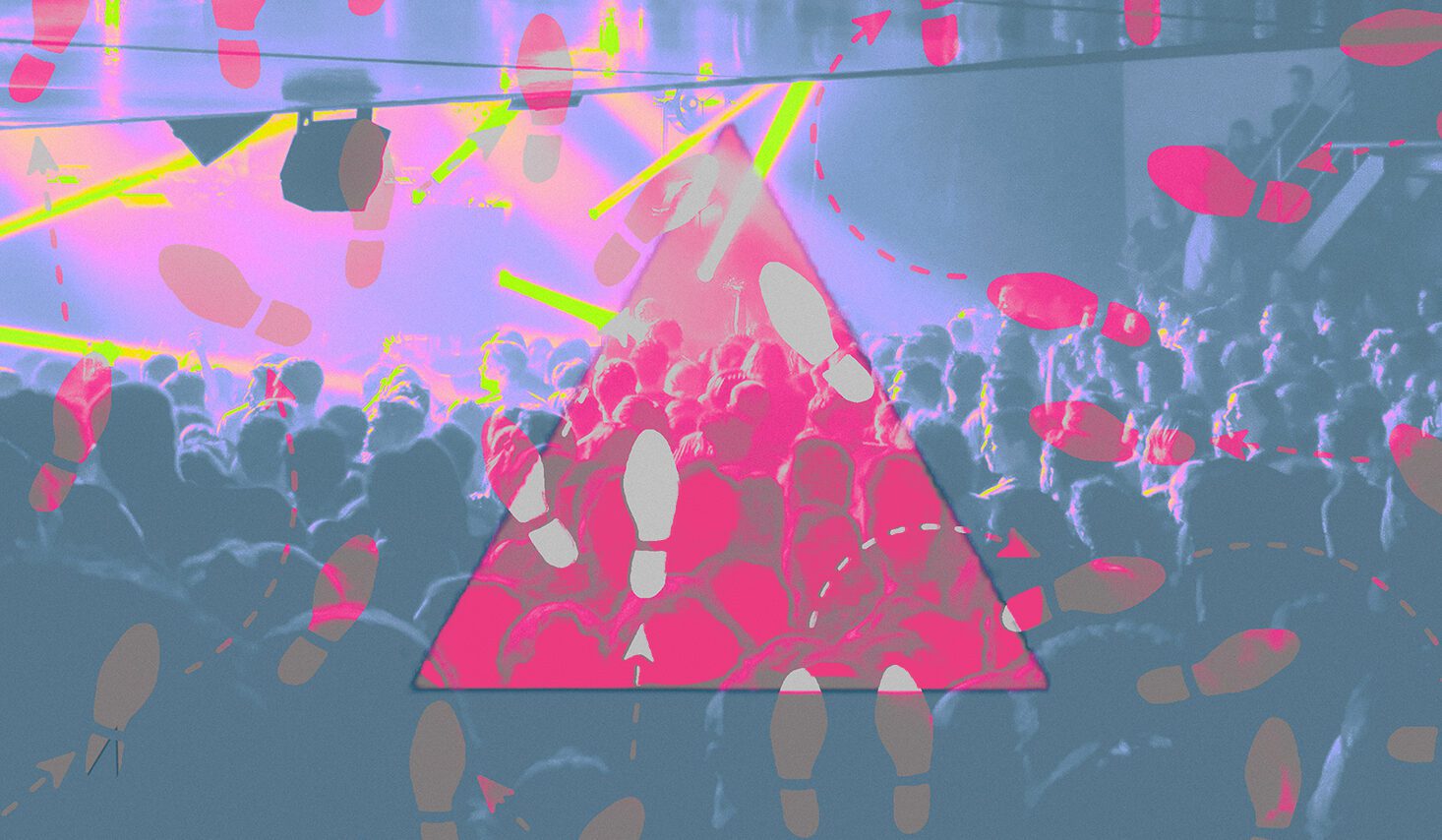
Nightclubs, bars and queer-dedicated venues have provided LGBTQIA+ people with a place to authentically be themselves for decades. The sticky dancefloor (and often, the packed smoking area) of a gay club or party is a space where we can embrace our queerness, lose our inhibitions and connect with other members of the community, all with the hope of being free from persecution and judgement.
While the number of queer spaces in the UK has been steadily decreasing for years, it’s undeniable that they’ve become more important for the community than ever. But although it might feel like everyone is catered for – from Pxssy Palace and Butch Please to Klub Verboten and Feel It – there’s still a part of our community unable to enjoy their night to the fullest: people living with HIV. According to research by Terrence Higgins Trust, 74% of people living with HIV in the UK say they’ve experienced stigma or discrimination due to their status. But how does this transpire in nightlife settings?
Michael O’Dea works at the charity as a chemsex service coordinator and has lived with HIV for six years. In his experience, the difficulty arises with door staff before he’s even stepped foot into a venue, and occurred once again on a recent night out in London. “I had my HIV medication in my wallet, and while I was getting searched, the security guard found it and told me it was ecstasy,” he says. “I’m really comfortable talking about my HIV status and it got sorted out, but I can imagine it could be nerve-racking for someone when a scene like that is caused on the door.”
Michael recalls entering a festival in Europe a few years ago with his medication in his bag. “They pulled out a full pack of my meds, and they began questioning me really intensely,” he explains. Attending the festival with a large group of friends, Michael – who hadn’t shared his HIV status publicly yet – subtly tried to explain what the tablets were, as multiple guards accused him of smuggling drugs into the festival to sell.
“It culminated with me shouting ‘I HAVE AIDS!’ before they understood.” Afterwards, the situation forced Michael to come out to his friends about his status. “Being put in that situation is really awkward… There are so many people who value their privacy when it comes to their status and who don’t want to be having these conversations, especially with strangers.”
Additionally, Michael – who as well as working at Terrence Higgins Trust is a community activist and member of the Berlin-based collective and event series Pornceptual – claims that after staff find his medication, most make a point of searching him even harder. “It’s like they’re thinking, ‘We’ve let you get away with this, so what else are you trying to hide?’” he says. “These spaces can be so empowering once you get in, but there are aspects that can be difficult for someone living with HIV to navigate. I only understood these difficulties – and had my own experiences validated – when I started working in nightlife myself.”
For adult entertainer and dancer John Thomas, the introduction of PrEP, and the increased awareness of U=U (Undetectable = Untransmittable), have changed his experience of going out for the better. “Beforehand, if I was getting close to someone in a club, I would tell them my status and then leave to use the bathroom,” he says. “I did it to give them the opportunity to leave without having to reject me to my face. I don’t have to worry about that anymore.”
However, John still doesn’t feel comfortable bringing his medication into nightlife settings: “There are some venues in London where I feel like I’m automatically treated with suspicion by the door staff.” But if John doesn’t go home after a night out – or doesn’t take his medication beforehand – not having it on his person could lead to a missed dose. “Adherence is important for the type of medication I take, but it’s not as important as it would be for someone on event-based PrEP. For them, missing a dose can be crucial and lead to a risk of transmission,” he says. “As a queer person, there comes a moment where you feel like you can be yourself on a night out, but that doesn’t happen until you get through the door of a club.”
Security staff are employed to keep us safe, but although they’re the gatekeepers of these much-needed spaces, it also feels like they’re the scariest people we encounter on a night out. Not only is this true for people living with HIV, but for the wider LGBTQIA+ community in general – whether guards are interrogating clubbers on their medication and gender identity (which John has witnessed first hand), forcibly removing disabled guests from the dancefloor, or even turning to physical violence on the door. “Very few club promoters actually own the venue they’re hosting in,” Michael says. “That’s where so much of the problem lies, as the venue staff don’t have the education to deal with a queer crowd… I think a lot of venues hold the belief that they don’t need to make ‘special arrangements’ for the queer community.”
But how can queer party organisers make their spaces safer for people living with HIV, and what steps are already being taken to ensure that they can enjoy these spaces free from stigma and discrimination? Clayton Wright is the co-founder and director of some of London’s most popular queer events, including Little Gay Brother, Feel It and Body Movements.
“Straight-owned security companies don’t understand our people, our culture, and they definitely don’t understand medicine we need to take to keep our sexual health in check,” he says. “Once you’ve been painfully stigmatised it’s obviously going to impact your night, make you feel like an outcast, and put you off from returning. How are you going to find the fun on the dancefloor with your peers when you can’t even get through the front door?”
Before Clayton throws a party in a venue, his team hands out a “robust respect policy” centred around the audience that will attend, which includes information on the language to use on the door and a section dedicated to recognising the medication used in the community. “The array of PrEP and HIV medication is truly mindblowing to so many security staff we’ve worked with,” Clayton says. “As well as recognising it, it’s important for them to understand that looking after your sexual health is a private matter – so no loud, awkward questioning.”
Additionally, his team provide security briefings before each event, offer handbooks detailing search policies, and host reflective workshops with staff so they can understand how invasive searching and particular lines of questioning make guests feel. “You have to get security firms to agree on these processes and hold them accountable. That means if someone is acting outside of that, I have the right to send them home,” he says, admitting that some venues are slower than others to take up these initiatives.
Despite this, he cites his work with iconic (and now sadly closed) London venue Printworks as proof of their success. Body Movements was one of the shows in the club’s last run earlier this year, and after Clayton’s team briefed them, they kept the door policies in place for the remainder of the season – including for events not specifically geared towards the LGBTQIA+ community. “When you see a massive club like that adopt all of your policies as gospel, that’s great change.”
Grassroots organisations like Impulse London and Safe Only are also working to significantly improve welfare, security and medical provision in queer nightlife spaces. Founded last year by Yiannis Katsorsi and Dani Dinger, Safe Only was created as a response to the “appalling” treatment queer people face by security and nightlife staff. “As queer people, we go to nightlife spaces to access somewhere we can thrive authentically, only to have our traumas and patterns of bullying repeated and compounded on the door,” Dani explains.
Now employing an inclusive team of 25 Security Industry Authority (SIA) workers, welfare staff and medics, Safe Only provide over 80 clients – including the ICA, The Clapham Grand and Mighty Hoopla – with queer-led training programmes and queer representation both on the door and in the medical room. On top of this, they partner with organisations such as The Love Tank to hand out safe sex materials and open up conversations about partying with HIV, including answering queries about sex in dark rooms, how medication may interact with alcohol and drugs, and providing people with support in dealing with an HIV diagnosis. “For many people, their only opportunity to connect with others living with HIV is in support settings, which are incredibly valuable. But meeting someone on a night out reminds them that they are holistic individuals with the same richness of experience as everyone else.”
Dani argues that there’s “no excuse” for venues and organisers to not know the basics when it comes to HIV – from PrEP to harm reduction concerning transmission. “There is nothing magical or mysterious about creating a welcoming environment for people living with HIV – and equally you don’t learn by osmosis. You have to be proactive in seeking this information out, and if you have a gap in your knowledge, take that on board and do some research.”
Michael recommends that queer parties with large social media followings use their platforms to spread awareness, from sharing clear community guidelines before events, to lobbying for health promotion to become a bigger priority in wider nightlife licencing. He also points out that when the London Nightlife Reduction Harm Summit (which is run by The Love Tank and Safe Only) was held in May, prominent organisers including Pxssy Palace, Riposte and Clayton’s team were present – but a number of notable ones were missing. “It makes you wonder if conversations are being had in these prominent spaces,” he says. “Everyone needs to be engaged together.”
It’s indisputable: queer spaces are institutional to the health and happiness of our community, and hold the power to implement fundamental change in our culture. They provide the backdrop to our favourite memories, the setting for our relationships to flourish, and a refuge from the stigma and oppression that we face in everyday life. That’s why it’s vital that they’re truly accessible to everyone.



